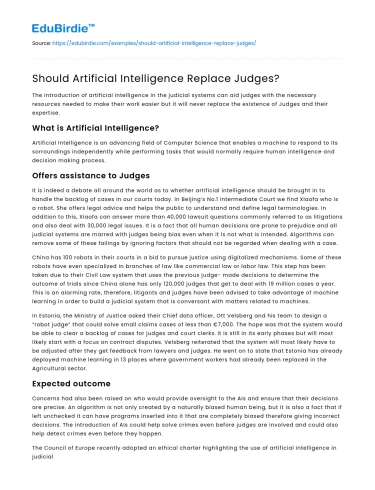The introduction of artificial intelligence in the judicial systems can aid judges with the necessary resources needed to make their work easier but it will never replace the existence of Judges and their expertise.
What is Artificial Intelligence?
Artificial Intelligence is an advancing field of Computer Science that enables a machine to respond to its sorroundings independently while performing tasks that would normally require human intelligence and decision making process.
Save your time!
We can take care of your essay
- Proper editing and formatting
- Free revision, title page, and bibliography
- Flexible prices and money-back guarantee
Offers assistance to Judges
It is indeed a debate all around the world as to whether artificial intelligence should be brought in to handle the backlog of cases in our courts today. In Beijing’s No.1 intermediate Court we find Xiaofa who is a robot. She offers legal advice and helps the public to understand and define legal terminologies. In addition to this, Xiaofa can answer more than 40,000 lawsuit questions commonly referred to as litigations and also deal with 30,000 legal issues. It is a fact that all human decisions are prone to prejudice and all judicial systems are marred with judges being bias even when it is not what is intended. Algorithms can remove some of these failings by ignoring factors that should not be regarded when dealing with a case.
China has 100 robots in their courts in a bid to pursue justice using digitalized mechanisms. Some of these robots have even specialized in branches of law like commercial law or labor law. This step has been taken due to their Civil Law system that uses the previous judge- made decisions to determine the outcome of trials since China alone has only 120,000 judges that get to deal with 19 million cases a year. This is an alarming rate, therefore, litigants and judges have been advised to take advantage of machine learning in order to build a judicial system that is conversant with matters related to machines.
In Estonia, the Ministry of Justice asked their Chief data officer, Ott Velsberg and his team to design a “robot judge” that could solve small claims cases of less than €7,000. The hope was that the system would be able to clear a backlog of cases for judges and court clerks. It is still in its early phases but will most likely start with a focus on contract disputes. Velsberg reiterated that the system will most likely have to be adjusted after they get feedback from lawyers and judges. He went on to state that Estonia has already deployed machine learning in 13 places where government workers had already been replaced in the Agricultural sector.
Expected outcome
Concerns had also been raised on who would provide oversight to the AIs and ensure that their decisions are precise. An algorithm is not only created by a naturally biased human being, but it is also a fact that if left unchecked it can have programs inserted into it that are completely biased therefore giving incorrect decisions. The introduction of AIs could help solve crimes even before judges are involved and could also help detect crimes even before they happen.
The Council of Europe recently adopted an ethical charter highlighting the use of artificial intelligence in judicial systems. Myriam Quemener, Advocate General at the Court of Appeal of Paris, and a Doctor in Law also stated that AIs will inevitably spread to the judicial system and it is of major importance to decide where it would most probably fit in.
The French National Assembly also voted on a reform of the justice system that would allow the use of AI to rule in cases of litigations worth less than €5000. In addition to that, they agreed that it would be appropriate to use AI in areas of law like matters to do with procedure and jurisdiction, which would be the best subjects for computerized decision making.
The members of the National Assembly felt that going this way would help give the courts time to handle tougher matters in law. AIs are only good as the programming that goes into it like in the United States, for example, some of the sentencing algorithms have been criticized as biased against blacks.
Another thing the government should also worry about is that once machines start making more decisions humans are less likely to inject their expertise into the system.
In summary, what should be done is a combination computer-judge system in which the computer makes the initial legal determination, and a judge counter-checks the decision. As a result, the law can be predicted easily, with the huge amounts of money spent in litigation being saved and through this confidence in the justice system will be greatly improved .The judges should not be replaced by Artificial Intelligence but its introduction in the judicial system should make its functions faster and better.






 Stuck on your essay?
Stuck on your essay?

